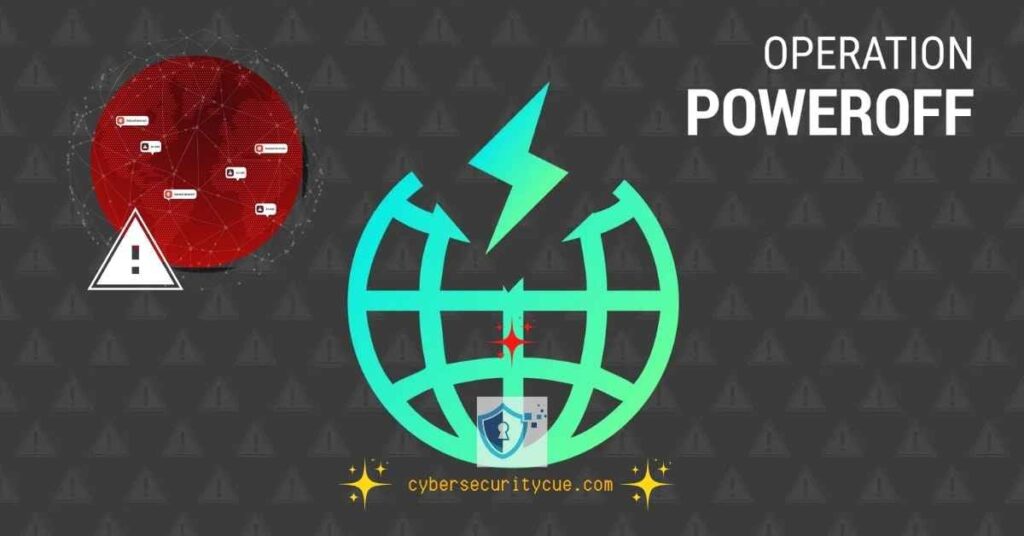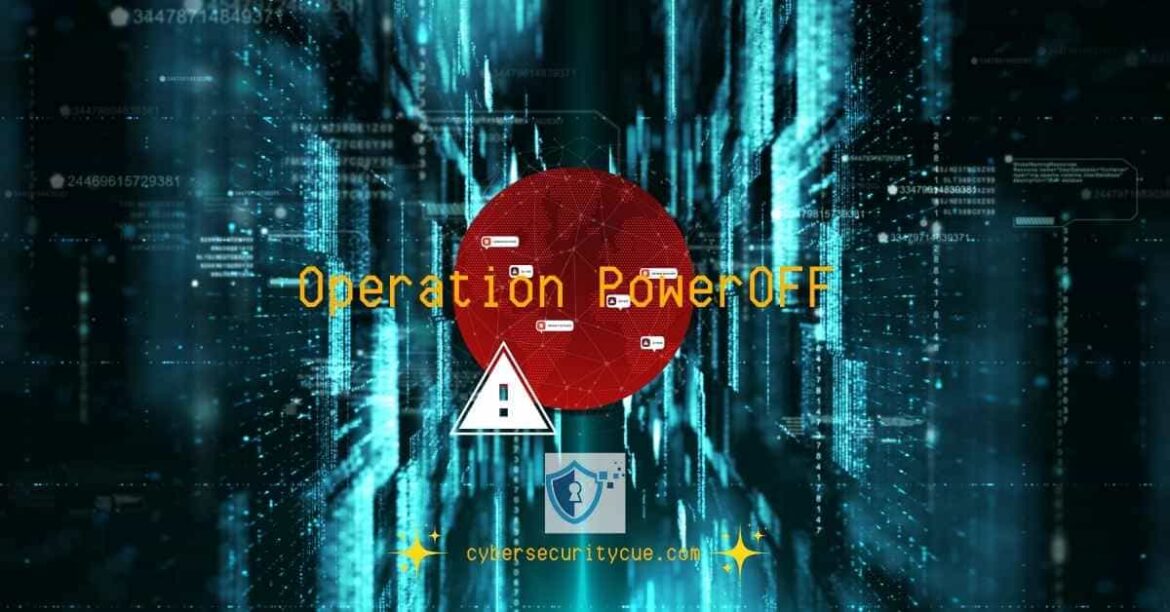Table of Contents
The holiday season is often a prime time for cybercriminals to unleash chaos, but this year, global law enforcement is fighting back with Operation PowerOFF DDoS crackdown.
Authorities worldwide have taken down 27 DDoS-for-hire platforms, also known as booter and stresser websites, that hackers use to flood websites with traffic and disrupt services.
Key Takeaway to Operation PowerOFF DDoS Crackdown:
- Operation PowerOFF DDoS crackdown is a significant global effort to disrupt cybercriminal activity and protect online infrastructure.
What is Operation PowerOFF?
Operation PowerOFF is a coordinated international effort involving Europol and law enforcement agencies from 15 countries. The operation aims to dismantle illegal platforms, hold their administrators accountable, and prevent future cyberattacks.
Highlights of the Operation
| Action | Details |
|---|---|
| Platforms Shut Down | 27 booter/stresser websites, including zdstresser.net and orbitalstress.net |
| Arrests Made | 3 administrators arrested in France and Germany |
| Users Targeted | Over 300 identified, with further operational actions planned |
Booter and stresser websites are tools that allow individuals, including inexperienced hackers, to launch Distributed Denial-of-Service (DDoS) attacks.
These attacks overwhelm a target’s servers with traffic, rendering websites and online services inaccessible.
A Holiday Season Tradition for Cybercriminals
The festive period has historically been a peak time for DDoS attacks. Cybercriminals exploit the season when businesses are most vulnerable, causing:
- Financial Losses: Downtime during the shopping rush can cost businesses millions.
- Reputational Damage: Consumers lose trust in brands unable to safeguard their services.
- Operational Disruption: Essential systems, including public infrastructure, can be paralyzed.
For example, the 2016 Dyn DDoS attack, launched using similar tools, took down major sites like Twitter and Netflix.
How Europol Coordinated the Crackdown
Europol played a critical role in the Operation PowerOFF DDoS crackdown. The agency’s European Cybercrime Centre (EC3) coordinated law enforcement efforts, provided forensic expertise, and facilitated the exchange of information through the Joint Cybercrime Action Taskforce (J-CAT).
Their strategy involved:
- Technical Sprints: One-week collaborative sessions to develop investigative leads.
- Crypto-Tracing: Tracking cryptocurrency transactions to uncover illegal activities.
- Real-Time Coordination: Connecting EU Member States through Europol’s liaison network.
Educating Potential Offenders: A Unique Approach
Operation PowerOFF isn’t just about arrests and shutdowns. It also includes a preventive component aimed at discouraging individuals from engaging in DDoS-for-hire activities.

Awareness Campaign Details
| Platform | Message |
|---|---|
| Google Search Ads | Targeting young users searching for DDoS tools. |
| YouTube Ads | Educational videos discouraging the use of illegal services. |
| Direct Outreach | Over 250 warning letters and 2,000 emails sent to users of booter platforms. |
This innovative approach recognizes that many offenders are young individuals unaware of the legal consequences of their actions.
The Global Effort
The success of the Operation PowerOFF DDoS crackdown was made possible by contributions from countries across the globe. Key participants include:
- United States: FBI, DOJ, and Homeland Security Investigations.
- United Kingdom: National Crime Agency (NCA).
- Australia: Australian Federal Police (AFP).
- Germany: Federal Criminal Police Office (Bundeskriminalamt).
Participating Authorities in Operation PowerOFF
The success of Operation PowerOFF’s DDoS crackdown was made possible by the collaboration of law enforcement agencies across the globe.
Here’s a detailed breakdown of the participating countries and their respective authorities:
| Country | Authority |
|---|---|
| Australia | Australian Federal Police (AFP) |
| Brazil | Federal Police (Polícia Federal) |
| Canada | Royal Canadian Mounted Police (RCMP) |
| Finland | National Police (Poliisi) |
| France | National Police (Police Nationale – OFAC), JUNALCO (Juridiction Nationale de Lutte contre la Criminalité Organisée) |
| Germany | Federal Criminal Police Office (Bundeskriminalamt), Hessian State Criminal Office (Hessisches Landeskriminalamt), Prosecutor General’s Office Frankfurt am Main – Cyber Crime Center (Generalstaatsanwaltschaft Frankfurt am Main – ZIT) |
| Japan | National Police Agency (NPA) |
| Latvia | State Police (Valsts policija) |
| The Netherlands | National Police (Politie) |
| Poland | Central Cybercrime Bureau (Centralne Biuro Zwalczania Cyberprzestępczości) |
| Portugal | Judiciary Police (Polícia Judiciária), Public Security Police (Polícia de Segurança Pública) |
| Sweden | Swedish Police Authority (Polisen – SC3), Regional Cybercrime Centre Region West (RC3) |
| Romania | Romanian Police (Poliția Română) |
| United Kingdom | National Crime Agency (NCA) |
| United States | U.S. Department of Justice (US DOJ), Federal Bureau of Investigation (FBI), Homeland Security Investigations (HSI), Defense Criminal Investigative Service (DCIS) |
For more details on Operation PowerOFF, visit the official Europol newsroom.
Real-Life Example: The 2016 Dyn Attack
One of the most infamous DDoS attacks occurred in 2016 when hackers targeted Dyn, a company that provides internet infrastructure. The attack disrupted major websites like Twitter, Amazon, and Netflix for hours.
The tools used in that attack were similar to those dismantled by Operation PowerOFF DDoS crackdown.
Rounding Up
The Operation PowerOFF DDoS crackdown showcases a global commitment to combatting cybercrime.
By dismantling illegal platforms, arresting key players, and launching awareness campaigns, law enforcement is sending a clear message: cybercriminals will face consequences.
The operation’s success highlights the importance of international collaboration in securing the digital world.
About Europol
Europol is the European Union’s law enforcement agency, facilitating cooperation among EU Member States to combat serious international crime. Its European Cybercrime Centre (EC3) specializes in tackling cyber threats. Learn more about Europol.
FAQs
What is Operation PowerOFF?
It’s an international law enforcement effort to shut down DDoS-for-hire platforms and hold offenders accountable.
What are booter and stresser websites?
These are illegal platforms that allow users to launch DDoS attacks by overwhelming a target’s servers.
Why does the holiday season see more DDoS attacks?
Hackers exploit the increased online activity during this period, causing maximum disruption.
How can I protect my business from DDoS attacks?
Use services like Content Delivery Networks (CDNs), enable rate-limiting, and monitor traffic for unusual spikes.
What should I do if I suspect a DDoS attack?
Contact your internet service provider immediately and implement pre-arranged mitigation strategies.
Can individuals be arrested for using booter websites?
Yes, even users of these platforms face legal consequences, as demonstrated by Operation PowerOFF DDoS crackdown.





